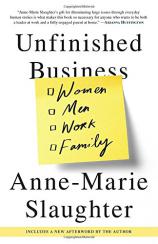Excerpt
Excerpt
Unfinished Business: Women Men Work Family

Less Is More
During the 2014 Super Bowl, Cadillac ran an ad that was meant to be a celebration of American workaholism. It showed a clean- cut fifty-something white man with blazing blue eyes walking and talking his way through his mansion while extolling the virtues of the American work ethic. “Other countries, they work, they stroll home, they stop by the café, they take August off. Off. Why aren’t you like that? Why aren’t we like that? Because we’re crazy, driven, hardworking believers,” says the guy, who looks like a cartoon version of a one-percenter, to the camera. The moral of the ad: If you just work hard enough, avoiding vacation and “creating your own luck,” anything, including the ownership of a $75,000 car, is possible.
The ad drove me crazy. The man was so smug and so completely out of touch with what I consider to be the real values that Americans have traditionally proclaimed and tried to pass down to their children. Yes, Europeans and others often criticize American culture for being materialistic, but when Thomas Jefferson described humankind’s “unalienable rights” in the Declaration of Independence, he took English Enlightenment philosopher John Locke’s “life, liberty, and estate” and substituted “life, liberty, and the pursuit of happiness.” And as the behavioral psychologists tell us, happiness is more likely to be found in the pleasures of human connection and experience—a good meal, a play or movie or sporting event, a bouquet of flowers or a bottle of champagne— than it is in an endless catalogue of possessions.
I wasn’t alone in my reaction. One reporter wrote, “You know what really needs attention? What working like crazy and taking no time off really gets us[?]” It gets Americans to the grave earlier, it’s made us more anxious than people in other developed countries, and it’s created a group of people more disengaged from their jobs than in countries with more leisure time. In the end, it was New Yorker writer Jeffrey Toobin who made the most damning argument against the commercial. As we were talking about it, he pointed out that Cadillac was disparaging the vacation-loving Europeans in an effort to sell luxury cars to a wealthy U.S. audience who prefer German BMWs and Mercedes. Last I checked, German workers get a mandated minimum twenty days of vacation every year.
It’s that simple. German workers work at least two weeks a year less than American workers do and yet produce better cars. Perhaps that is because German managers still subscribe to the empirical findings that led Henry Ford to establish an eight-hour workday in 1914. When Ford looked at in-house research, he realized that manual laborers were finished after eight hours of work a day. After he cut hours, errors went down, and productivity, employee satisfaction, and company profits went up.
We actually have a growing body of data in support of the proposition that working less means working better. According to much more recent research, people who work principally with their brains rather than their hands have an even shorter amount of real daily productivity than manual laborers. Microsoft employees, for instance, reported that they put in only twenty-eight productive hours in a forty-five-hour workweek—a little less than six hours a day. Futurist Sara Robinson found the same thing: knowledge workers have fewer than eight hours a day of hard mental labor in them before they start making mistakes.
This relationship between working better and working less holds particularly true in any job requiring creativity, the well- spring of innovation. Experts on creativity emphasize the value of nonlinear thinking and cultivated randomness, from long walks to looking at your environment in ways you never have before. Making time for play, as well as designated downtime, has also been found to boost creativity. Experts suggest we should change the rhythm of our workdays to include periods in which we are simply letting our minds run wherever they want to go. Without play, we might never be able to make the unexpected connections that are the essence of insight.
Unfinished Business: Women Men Work Family
- Genres: Cultural Studies, Family, Family Life, Nonfiction, Social Issues, Social Sciences, Women’s Issues
- paperback: 368 pages
- Publisher: Random House Trade Paperbacks
- ISBN-10: 0812984978
- ISBN-13: 9780812984972








